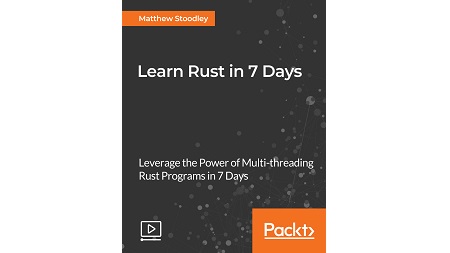
English | MP4 | AVC 1920×1080 | AAC 48KHz 2ch | 5h 38m | 1.24 GB
Use the full power of Rust to make fast, maintainable systems level programs in one week
The Rust programming language makes it possible to build fast reliable code, prevents segfaults, and guarantees memory safety, even while working across concurrent processes.
The course is split into seven parts, which give you a complete overview of why Rust is a great programming language. In the first couple of days, you’ll learn to install Rust on your system, discover its syntax, and see a library that utilizes the feature of trait-based generics and code reusability.
On days 3 and 4, you’ll understand how Rust Lifetimes work by doing extensive compiler checking and learn to make your programs more interactive by accessing all the bits of the Rust environment. On day 5, you’ll learn about multithreading without data races with safe concurrency. Day 6, you’ll create a database, using your code to read and update while securing it with Bcrypt from various breaches such as SQL injection attacks.
By the end of the course, you’ll have built a mini-bank application that tracks users’ financial transactions over time, allowing them to view their history over time.
This course takes the approach that some things are easier to learn once a foundation is in place, and in Rust that foundation is “traits”. Each section builds on the last until at the end of the course we will have built a parcel tracker application, using Rust’s ability to integrate with the whole system.
What You Will Learn
- Use the Rust trait system to build super flexible types
- Effective ways of handling Rust Errors without Boilerplate code
- How pointer lifetimes keep your code effective and safe
- Work within the restrictions needed for pointer safety, and still achieve capable code
- How rust programs can work with other system programs
- Write programs that take full advantage of multicore processors, using concurrency without the risk of data races
- Loop on anything with the Iterator Trait
- How to Use the Rocket web framework to build powerful websites quickly
Table of Contents
Getting Started with Basic Tools and Syntax
1 The Course Overview
2 Get Rust Working on Your Machine
3 Introducing Standard Rust Operators and Syntax
4 Basic Loops
5 Basic Strings
6 Structs and Methods
7 Enums and Pattern Matching
8 Result and Option Types
9 Assignment
Traits
10 Introduction to Traits
11 Using Other People’s Libraries
12 Defining Our Own Traits
13 Accepting Generic Parameters
14 Generic Structs
15 Generic Iterators
16 Useful traits
17 Error Handling with the from Trait
18 Documenting and Publishing Your Library
19 Assignment
Lifetimes
20 Why Lifetimes Matter
21 Passing a Borrow Forward
22 Stack versus Heap – Box and the Deref Trait
23 The Static Lifetime
24 Reference Counting
25 Assignment
The Program Environment
26 Environment Variables
27 Calling Other Programs
28 Piping Between Other Programs
29 Files Access
30 Assignment
Threads and Channels
31 Threads
32 Channels
33 Mutexes
34 Thread Pools and Worker
35 Rayon for Embarrassingly Parallel Problems
36 Assignment
Databases
37 Introduction to SQLite
38 Secure Passwords
39 Adding to the Database
40 Retrieving from the Database
41 Assignment
Building Our Database into an Online Banks
42 Introduction to Rocket
43 HTML Templates with Maud
44 Managing Sessions
45 Web Login
46 Accessing Sessions
47 Assignment
Resolve the captcha to access the links!